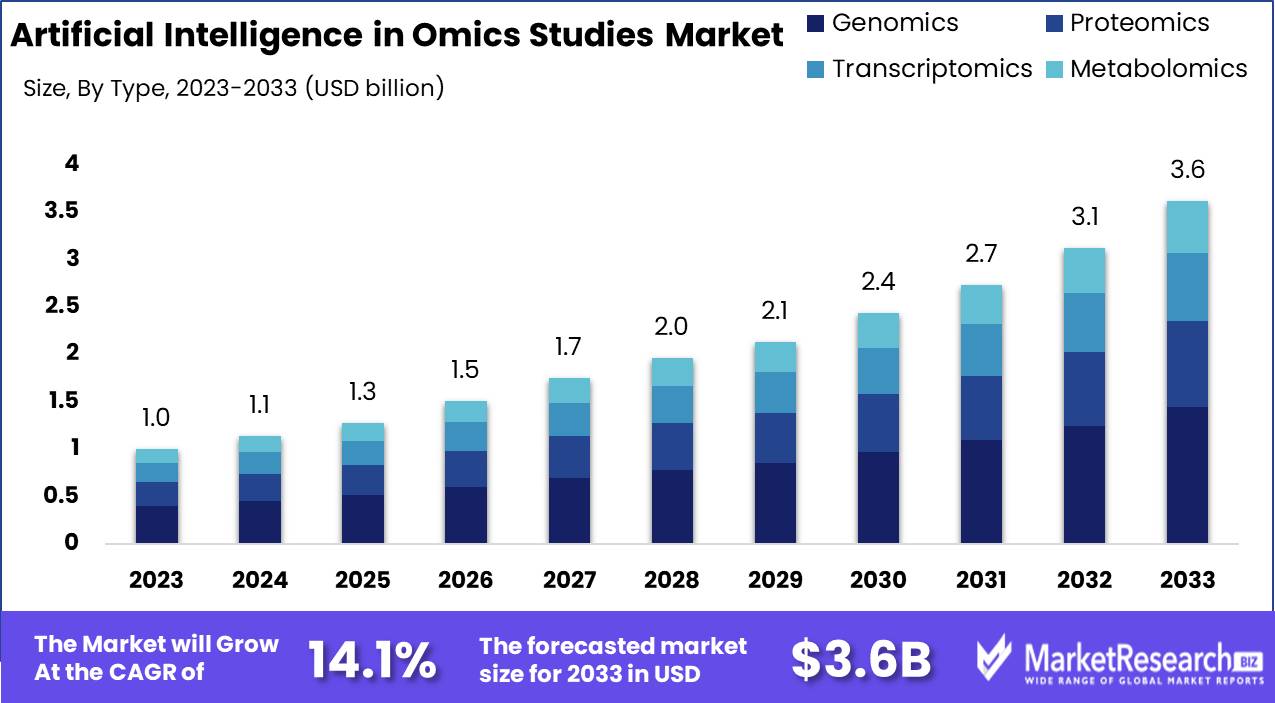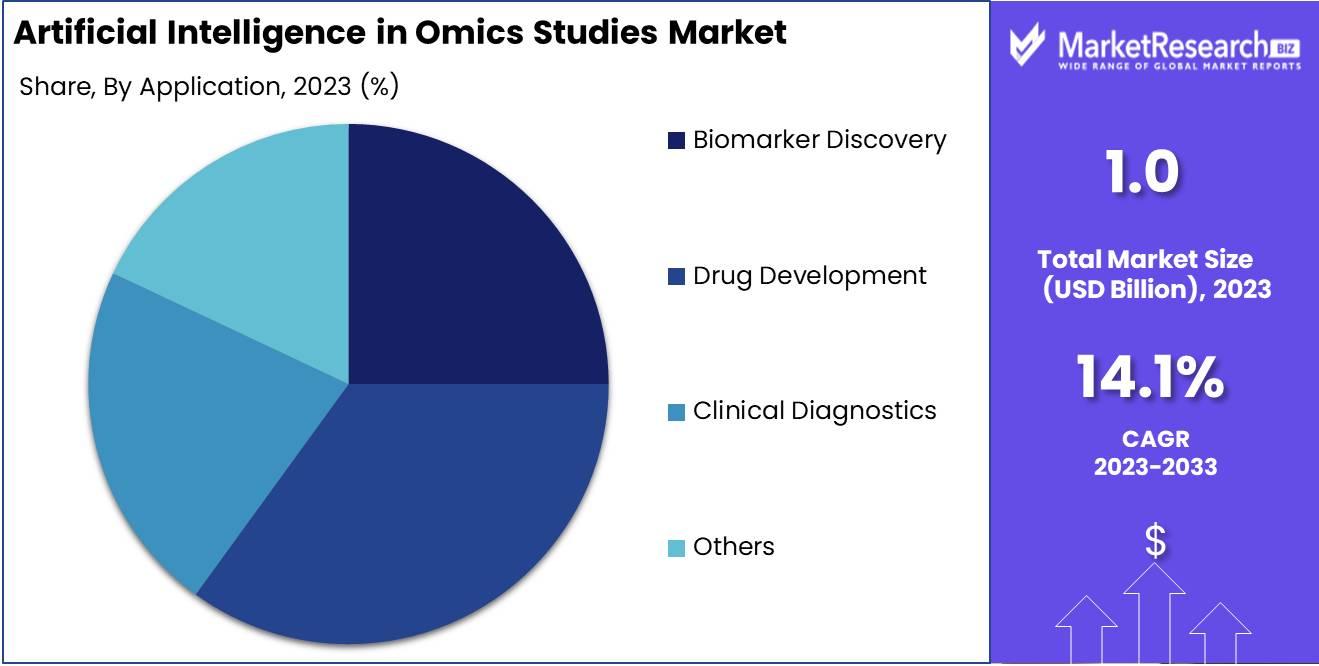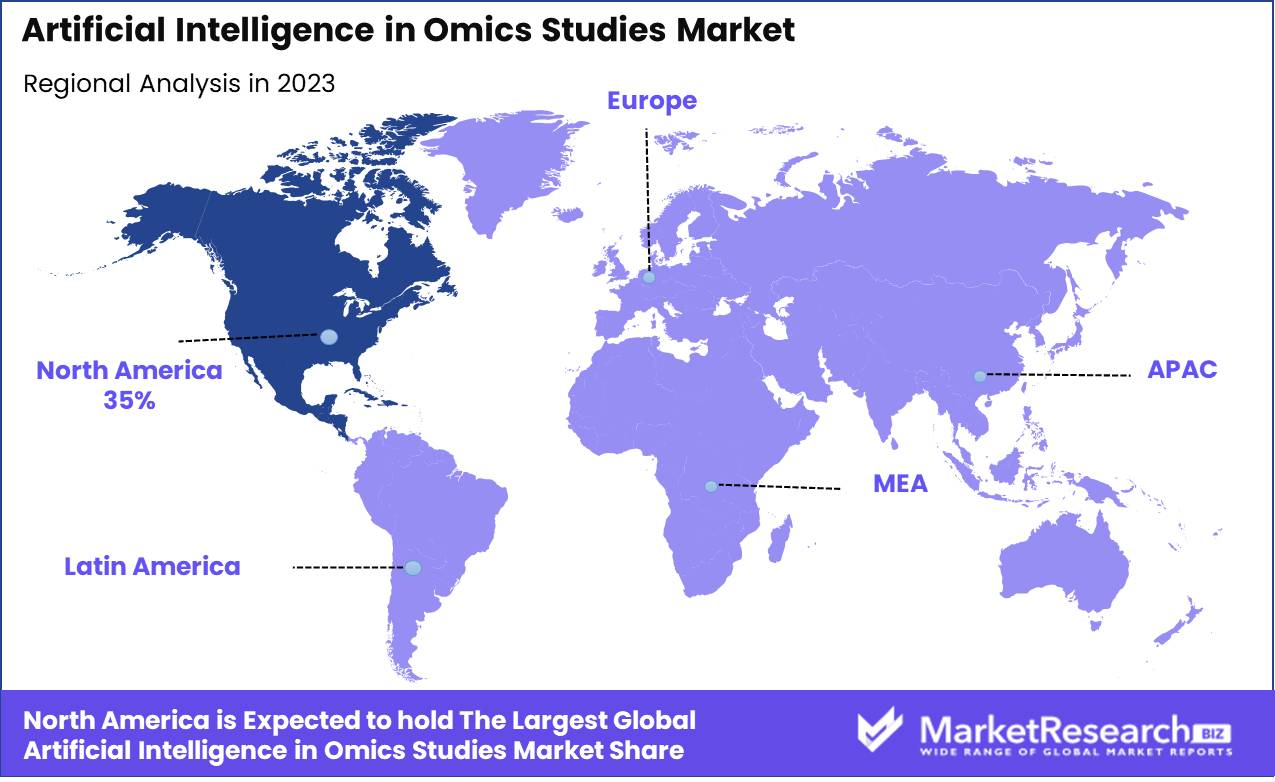
Artificial Intelligence In Omics Studies Market By Type (Genomics, Proteomics, Transcriptomics, Metabolomics), By Application (Biomarker Discovery, Drug Development, Clinical Diagnostics, Others), By End-User (Biotechnology Companies, Research Institutes, Healthcare Providers), By Region and Companies - Industry Segment Outlook, Market Assessment, Competition Scenario, Trends and Forecast 2024-2033
-
50389
-
Aug 2024
-
304
-
-
This report was compiled by Vishwa Gaul Vishwa is an experienced market research and consulting professional with over 8 years of expertise in the ICT industry, contributing to over 700 reports across telecommunications, software, hardware, and digital solutions. Correspondence Team Lead- ICT Linkedin | Detailed Market research Methodology Our methodology involves a mix of primary research, including interviews with leading mental health experts, and secondary research from reputable medical journals and databases. View Detailed Methodology Page
-
Quick Navigation
Report Overview
The Global Artificial Intelligence In Omics Studies Market was valued at USD 1.0 Bn in 2023. It is expected to reach USD 3.6 Bn by 2033, with a CAGR of 14.1% during the forecast period from 2024 to 2033.
The Artificial Intelligence in Omics Studies Market focuses on the application of AI technologies to analyze complex biological data across various "omics" fields, including genomics, proteomics, and metabolomics. AI's ability to process vast datasets and uncover hidden patterns is driving significant advancements in systems biology, drug discovery, and personalized medicine. This market is characterized by rapid innovation, with AI-driven tools enabling more precise and efficient interpretation of multifaceted biological interactions. As the demand for personalized healthcare solutions grows, the AI in omics studies market is poised for substantial growth, transforming biomedical research and therapeutic development.

The Artificial Intelligence in Omics Studies Market is emerging as a cornerstone of modern biomedical research, providing the tools necessary to decode complex biological systems at an unprecedented scale. AI-driven predictions, such as AlphaFold’s revolutionary approach to protein structure modeling, have significantly advanced drug discovery. AlphaFold's accuracy, demonstrated by predicting protein structures with an average error of just 1.6 Ångströms across over 170,000 protein sequences, highlights AI's transformative potential in omics studies. This breakthrough not only accelerates the drug development process but also opens new avenues for understanding diseases at a molecular level.
Further solidifying AI's impact, a recent collection of 12 articles underscores its critical role in bioinformatics within omics studies. These publications highlight how AI is driving advancements in systems biology and personalized medicine, areas that are increasingly reliant on the integration of diverse omics data. The surge in investment in AI-driven research methodologies reflects a broader recognition of AI's capacity to revolutionize biomedical research.
As AI continues to evolve, its applications in omics studies are expected to expand, catalyzing innovation and driving the market forward. The ability to integrate and interpret large-scale biological data positions AI as a pivotal force in the future of healthcare, particularly in the development of personalized treatment strategies.
Key Takeaways
- Market Value: The Global Artificial Intelligence In Omics Studies Market was valued at USD 1.0 Bn in 2023. It is expected to reach USD 3.6 Bn by 2033, with a CAGR of 14.1% during the forecast period from 2024 to 2033.
- By Type: Genomics represents 40% of the market, focusing on AI-driven analysis of genetic information.
- By Application: Drug Development constitutes 35%, utilizing AI to accelerate the discovery and development of new therapeutics.
- By End-User: Biotechnology Companies make up 45%, relying on AI for advanced omics studies and research.
- Regional Dominance: North America holds a 35% market share, driven by strong research and development in the biotechnology sector.
- Growth Opportunity: Expanding AI tools for multi-omics integration can provide deeper insights into biological processes, driving advancements in drug development.
Driving factors
Increasing Complexity and Volume of Omics Data
The rapid advancement of high-throughput technologies in genomics, proteomics, metabolomics, and other omics disciplines has led to an exponential increase in the complexity and volume of data generated. This surge in data presents significant challenges for researchers and clinicians who require efficient and accurate tools to analyze and interpret vast datasets. Traditional data analysis methods struggle to keep pace with the sheer volume of omics data, creating a critical need for advanced solutions.
Artificial intelligence (AI) is uniquely positioned to address these challenges, offering sophisticated algorithms capable of processing, integrating, and interpreting complex datasets. The increasing complexity and volume of omics data are thus key drivers of the growing adoption of AI in omics studies, as stakeholders seek to unlock the full potential of this data for research and clinical trials.
Growth in Multi-Omics Approaches for Disease Research
The shift toward multi-omics approaches in disease research is another significant factor contributing to the growth of AI in omics studies. Multi-omics involves the integration of data from multiple omics layers—such as genomics, transcriptomics, proteomics, and metabolomics—to gain a comprehensive understanding of biological systems and disease mechanisms. This approach provides a more holistic view of the molecular underpinnings of diseases, enabling more accurate biomarker discovery and therapeutic target identification.
The integration of diverse datasets from different omics platforms is complex and requires advanced computational tools. AI-driven solutions are increasingly being utilized to facilitate the integration and analysis of multi-omics data, enhancing the ability to uncover novel insights in disease research. As multi-omics approaches become more prevalent, the demand for AI technologies to manage and analyze these complex datasets will continue to rise, driving market growth.
Advancements in AI-Driven Data Integration and Analysis
Recent advancements in AI-driven data integration and analysis are playing a crucial role in the evolution of omics studies. AI technologies are becoming more sophisticated in their ability to integrate disparate data types, identify patterns, and generate actionable insights. These capabilities are particularly valuable in omics studies, where the ability to connect data from various sources and uncover hidden relationships can lead to breakthroughs in understanding disease mechanisms and developing personalized therapies.
AI algorithms can now analyze omics data alongside clinical and environmental data, providing a more comprehensive picture of health and disease. The ongoing advancements in AI-driven data integration are not only enhancing the precision of omics studies but also expanding their utility in personalized medicine, drug development, and public health initiatives. This trend is a major driver of market growth, as organizations increasingly invest in AI technologies to stay at the forefront of omics research.
Restraining Factors
High Cost of AI Tools and Infrastructure
One of the primary restraining factors for the growth of the Artificial Intelligence (AI) in Omics Studies Market is the high cost associated with AI tools and infrastructure. The deployment of AI technologies in omics studies requires significant investment in advanced computational systems, specialized software, and data storage solutions. These costs can be prohibitive, particularly for smaller research institutions and startups, limiting their ability to adopt AI-driven solutions.
The ongoing expenses related to maintaining, upgrading, and scaling these systems add to the financial burden. As a result, the high cost of AI tools and infrastructure acts as a significant barrier to market accessibility, potentially slowing the widespread adoption of AI in omics studies and hindering overall market growth. This financial constraint could limit the benefits of AI to only well-funded organizations, thereby restricting the democratization of advanced omics research.
Data Privacy and Ethical Concerns: Impeding AI Adoption in Omics Studies
Data privacy and ethical concerns are another major restraining factor in the AI in Omics Studies Market. Omics studies often involve the collection and analysis of vast amounts of sensitive biological data, which raises critical issues regarding data security, consent, and potential misuse. The integration of AI into these studies intensifies these concerns, as AI systems require access to large datasets to function effectively, increasing the risk of data breaches and unauthorized use.
The use of AI in analyzing human genetic information can lead to ethical dilemmas, such as potential discrimination or privacy violations. These concerns have led to stricter regulatory frameworks and compliance requirements, which can complicate the implementation of AI technologies in omics research. Public apprehension about data privacy may result in reduced participation in omics studies, limiting the availability of data necessary for AI-driven insights. Addressing these ethical and privacy issues is crucial for fostering trust and ensuring the sustainable growth of AI in the omics studies market.
By Type Analysis
In 2023, Genomics held a dominant market position in the By Type segment of the Artificial Intelligence in Omics Studies Market, capturing more than a 40% share.
Genomics is the leading segment in AI-driven omics studies, largely due to the rapid advancements in genomic sequencing technologies and the increasing availability of large-scale genomic data. AI's ability to analyze complex and voluminous genomic datasets has revolutionized how genetic information is interpreted, leading to breakthroughs in understanding disease mechanisms, identifying genetic mutations, and enabling precision medicine. The integration of AI in genomics has been particularly influential in oncology, where it aids in the identification of cancer biomarkers and the development of personalized treatment plans.
Proteomics, spatial Transcriptomics, and Metabolomics, while also integral to omics studies, serve more specialized roles. Proteomics involves the study of proteins and their functions, where AI helps in predicting protein structures and understanding protein-protein interactions. Transcriptomics focuses on RNA expression patterns, and AI aids in deciphering gene expression data, critical for understanding gene regulation. Metabolomics, which studies metabolic processes, benefits from AI's capacity to analyze complex biochemical data, offering insights into metabolic changes in diseases. Despite their importance, these areas do not match the broad applicability and impact of AI in Genomics.
By Application Analysis
In 2023, Drug Development held a dominant market position in the By Application segment of the Artificial Intelligence in Omics Studies Market, capturing more than a 35% share.
AI's role in Drug Development within omics studies has become increasingly prominent, particularly as pharmaceutical companies seek to streamline the drug discovery process and reduce the time and cost associated with bringing new therapies to market. AI-driven omics studies facilitate the identification of novel drug targets, predict drug responses based on genetic profiles, and optimize clinical trial designs by selecting the right patient cohorts. The integration of AI in Drug Development is crucial for developing personalized medicines and identifying therapeutic candidates for complex diseases, which has led to its dominant position in this segment.
Biomarker Discovery and Clinical Diagnostics are also significant applications of AI in omics studies. Biomarker Discovery leverages AI to identify biological markers that indicate the presence of a disease, aiding in early diagnosis and the development of targeted therapies. Clinical Diagnostics utilizes AI to interpret omics data for diagnosing diseases more accurately and swiftly. Although critical to the advancement of personalized medicine and targeted therapies, these applications remain secondary to the broader impact of AI in Drug Development.
By End-User Analysis
In 2023, Biotechnology Companies held a dominant market position in the By End-User segment of the Artificial Intelligence in Omics Studies Market, capturing more than a 45% share.
Biotechnology Companies are leading the adoption of AI in omics studies, driven by their need to innovate and stay competitive in the rapidly evolving life sciences industry. These companies use AI to enhance research and development efforts, particularly in areas like drug discovery, biomarker identification, and personalized medicine. The ability of AI to process and analyze complex omics data has enabled biotech firms to accelerate the discovery of new therapies, optimize drug development pipelines, and bring precision medicine closer to clinical practice, thereby maintaining their dominance in this market segment.
Research Institutes and Healthcare Providers also play crucial roles in the AI-driven omics studies market. Research Institutes focus on fundamental and translational research, often collaborating with biotech companies to apply AI in understanding disease mechanisms and developing new treatments. Healthcare Providers, on the other hand, are beginning to integrate AI-driven omics studies into clinical practice, particularly in personalized medicine and diagnostics. However, their impact on the market is less pronounced compared to the significant investments and advancements driven by Biotechnology Companies.

Key Market Segments
By Type
- Genomics
- Proteomics
- Transcriptomics
- Metabolomics
By Application
- Biomarker Discovery
- Drug Development
- Clinical Diagnostics
- Others
By End-User
- Biotechnology Companies
- Research Institutes
- Healthcare Providers
Growth Opportunity
Development of AI-Driven Multi-Omics Platforms for Personalized Medicine
The ongoing development of AI-driven multi-omics platforms represents a significant opportunity for the global Artificial Intelligence in Omics Studies Market in 2024. These platforms integrate data from various omics layers—such as genomics, proteomics, and metabolomics—to provide a comprehensive view of an individual’s biological makeup. AI plays a crucial role in analyzing this complex data, enabling the identification of personalized treatment strategies based on a patient’s unique omics profile.
This advancement is particularly impactful in the realm of personalized medicine, where tailored therapies can lead to improved patient outcomes and reduced healthcare costs. As healthcare systems worldwide increasingly shift towards personalized medicine, the demand for AI-driven multi-omics platforms is expected to surge, driving significant growth in the AI in omics studies market.
Expansion in Systems Biology and Integrative Omics Research
Another key opportunity in 2024 is the expansion of systems biology and integrative omics research, both of which are heavily reliant on AI technologies. Systems biology aims to understand the complex interactions within biological systems, and integrative omics research combines multiple omics datasets to uncover new insights into disease mechanisms and biological functions.
AI is essential in this context, as it can process and integrate large, diverse datasets to identify patterns and relationships that would be impossible to discern using traditional methods. The expansion of these research areas is expected to accelerate scientific discoveries, particularly in disease research and drug development, thereby contributing to the growth of the AI in omics studies market.
Latest Trends
Use of AI for Predictive Modeling and Biomarker Discovery
In 2024, the use of artificial intelligence (AI) for predictive modeling and biomarker discovery is emerging as a pivotal trend in the omics studies market. AI-driven predictive models are increasingly being utilized to analyze omics data, enabling researchers to forecast disease risk, progression, and treatment outcomes with greater accuracy. This capability is particularly valuable in identifying biomarkers—molecular signatures that can indicate the presence of a disease or predict a patient’s response to treatment.
By leveraging AI, researchers can sift through vast datasets to uncover novel biomarkers more efficiently, accelerating the development of targeted therapies and personalized treatment plans. This trend is expected to significantly enhance the precision of medical interventions and drive the adoption of AI in omics studies, contributing to market growth.
Integration with Big Data Analytics and Machine Learning
Another major trend in 2024 is the integration of AI with big data analytics and machine learning, which is revolutionizing how omics data is processed and interpreted. As omics research generates increasingly large and complex datasets, the need for robust analytical tools has become critical. AI, combined with big data analytics and machine learning, offers powerful solutions for managing and analyzing these datasets.
Machine learning algorithms, in particular, are capable of learning from data and improving their predictive accuracy over time, making them indispensable for identifying patterns, correlations, and insights in omics research. This integration is expected to enhance research efficiency, reduce the time required for data analysis, and lead to more rapid scientific discoveries, thereby driving the expansion of the AI in omics studies market.
Regional Analysis
North America is the dominating region in the Artificial Intelligence in Omics Studies Market, commanding a 35% share.
North America's dominance in the AI in Omics Studies market is primarily attributed to its strong technological infrastructure, significant investments in research and development, and a well-established healthcare system. The United States leads the region, with extensive integration of AI in various omics disciplines, including genomics, proteomics, and metabolomics. The presence of leading biotech companies and academic institutions specializing in omics research further strengthens the market. Government initiatives, such as the Precision Medicine Initiative, are also playing a crucial role in propelling the growth of the market in North America, contributing to its 35% market share.
Europe is another key region in the AI in Omics Studies market, driven by strong collaborations between research institutions, universities, and AI companies. Countries like Germany, the United Kingdom, and France are leading the adoption of AI in omics studies, supported by government funding and a conducive regulatory environment. The European market is also benefiting from the region's focus on personalized medicine and precision healthcare, with AI playing a critical role in data analysis and interpretation across various omics fields.
The Asia Pacific region is emerging as a significant player in the AI in Omics Studies market, with rapid advancements in AI technology and increasing investments in healthcare. Countries such as China, Japan, and South Korea are at the forefront of integrating AI into omics studies, driven by a growing focus on precision medicine and the need to address complex healthcare challenges. The region's large population and rising healthcare expenditures are fueling market growth, while government initiatives aimed at promoting AI and healthcare innovation are further supporting the expansion of the market in Asia Pacific.

Key Regions and Countries
North America
- US
- Canada
- Mexico
Western Europe
- Germany
- France
- The UK
- Spain
- Italy
- Portugal
- Ireland
- Austria
- Switzerland
- Benelux
- Nordic
- Rest of Western Europe
Eastern Europe
- Russia
- Poland
- The Czech Republic
- Greece
- Rest of Eastern Europe
APAC
- China
- Japan
- South Korea
- India
- Australia & New Zealand
- Indonesia
- Malaysia
- Philippines
- Singapore
- Thailand
- Vietnam
- Rest of APAC
Latin America
- Brazil
- Colombia
- Chile
- Argentina
- Costa Rica
- Rest of Latin America
Middle East & Africa
- Algeria
- Egypt
- Israel
- Kuwait
- Nigeria
- Saudi Arabia
- South Africa
- Turkey
- United Arab Emirates
- Rest of MEA
Key Players Analysis
In 2024, the global Artificial Intelligence in Omics Studies Market is shaped by leading companies such as Google DeepMind, IBM Corporation, NVIDIA Corporation, Microsoft Corporation, Thermo Fisher Scientific Inc., F. Hoffmann-La Roche Ltd, Illumina Inc., Deep Genomics, Molecular Health GmbH, and BioSymetrics Inc.
Google DeepMind is a major player, applying its advanced AI algorithms to various omics studies, enhancing data analysis and interpretation across genomics, proteomics, and metabolomics. IBM Corporation and NVIDIA Corporation provide critical AI technologies that support high-performance computing and machine learning tasks in omics research.
Microsoft Corporation’s AI solutions facilitate large-scale data integration and analysis, driving innovation in omics studies. Thermo Fisher Scientific Inc. and F. Hoffmann-La Roche Ltd offer AI-enhanced tools for genomic and proteomic research, advancing the understanding of complex biological systems.
Illumina Inc. integrates AI with its sequencing technologies to improve data accuracy and interpretation. Deep Genomics, Molecular Health GmbH, and BioSymetrics Inc. contribute specialized AI solutions that accelerate the discovery of biomarkers and therapeutic targets.
Market Key Players
- Google DeepMind
- IBM Corporation
- NVIDIA Corporation
- Microsoft Corporation
- Thermo Fisher Scientific Inc.
- F. Hoffmann-La Roche Ltd
- Illumina Inc.
- Deep Genomics
- Molecular Health GmbH
- BioSymetrics Inc.
Recent Development
- In April 2024, Illumina Inc. introduced an AI-enhanced omics platform that enables faster and more accurate analysis of proteomics and genomics data. This platform aims to reduce research timelines by 25%.
- In February 2024, Google DeepMind released an AI model tailored for multi-omics data integration, which significantly boosts accuracy in disease prediction by 35%. This advancement is set to revolutionize personalized healthcare.
Report Scope
Report Features Description Market Value (2023) USD 1.0 Bn Forecast Revenue (2033) USD 3.6 Bn CAGR (2024-2033) 14.1% Base Year for Estimation 2023 Historic Period 2018-2023 Forecast Period 2024-2033 Report Coverage Revenue Forecast, Market Dynamics, Competitive Landscape, Recent Developments Segments Covered By Type (Genomics, Proteomics, Transcriptomics, Metabolomics), By Application (Biomarker Discovery, Drug Development, Clinical Diagnostics, Others), By End-User (Biotechnology Companies, Research Institutes, Healthcare Providers) Regional Analysis North America - The US, Canada, & Mexico; Western Europe - Germany, France, The UK, Spain, Italy, Portugal, Ireland, Austria, Switzerland, Benelux, Nordic, & Rest of Western Europe; Eastern Europe - Russia, Poland, The Czech Republic, Greece, & Rest of Eastern Europe; APAC - China, Japan, South Korea, India, Australia & New Zealand, Indonesia, Malaysia, Philippines, Singapore, Thailand, Vietnam, & Rest of APAC; Latin America - Brazil, Colombia, Chile, Argentina, Costa Rica, & Rest of Latin America; Middle East & Africa - Algeria, Egypt, Israel, Kuwait, Nigeria, Saudi Arabia, South Africa, Turkey, United Arab Emirates, & Rest of MEA Competitive Landscape Google DeepMind, IBM Corporation, NVIDIA Corporation, Microsoft Corporation, Thermo Fisher Scientific Inc., F. Hoffmann-La Roche Ltd, Illumina Inc., Deep Genomics, Molecular Health GmbH, BioSymetrics Inc. Customization Scope Customization for segments, region/country-level will be provided. Moreover, additional customization can be done based on the requirements. Purchase Options We have three licenses to opt for: Single User License, Multi-User License (Up to 5 Users), Corporate Use License (Unlimited User and Printable PDF) -
-
- Google DeepMind
- IBM Corporation
- NVIDIA Corporation
- Microsoft Corporation
- Thermo Fisher Scientific Inc.
- F. Hoffmann-La Roche Ltd
- Illumina Inc.
- Deep Genomics
- Molecular Health GmbH
- BioSymetrics Inc.




